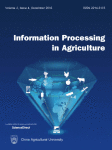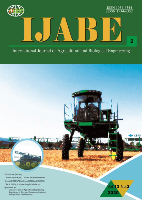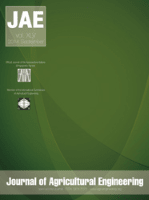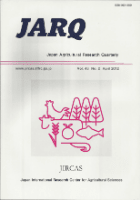
AMA-Agricultural Mechanization in Asia Africa and Latin America
Scope & Guideline
Pioneering Research for a Sustainable Agricultural Future
Introduction
Aims and Scopes
- Agricultural Machinery Development:
Research on the design, development, and performance evaluation of new agricultural machinery and tools tailored for specific crops and conditions. - Mechanization Impact Studies:
Analyzing the effects of mechanization on agricultural productivity, economic viability, and resource conservation. - Sustainable Agricultural Practices:
Exploration of sustainable and environmentally friendly technologies in agriculture, including renewable energy applications. - Regional Agricultural Mechanization:
Focus on the specific needs and challenges of agricultural mechanization in Asia, Africa, and Latin America, considering local practices and conditions. - Innovative Technologies:
Integration of cutting-edge technologies such as sensor-based systems, automation, and data analytics into agricultural practices.
Trending and Emerging
- Precision Agriculture Technologies:
There is a growing emphasis on precision agriculture, utilizing advanced technologies such as sensors and data analytics to optimize resource use and improve crop yields. - Renewable Energy in Agriculture:
Research focusing on the integration of renewable energy sources, such as solar and biomass, into agricultural practices is on the rise, reflecting a shift towards sustainability. - Automation and Robotics:
Emerging studies on automation and robotics in agriculture indicate a trend towards mechanization that reduces labor needs and enhances operational efficiency. - Techno-Economic Assessments:
Increasingly detailed assessments of the economic viability and sustainability of various mechanization technologies are becoming a focal point in recent research, aiding in decision-making for farmers. - Ergonomics in Agricultural Machinery:
There is a noticeable trend towards considering ergonomic design in agricultural machinery to improve user comfort and efficiency, especially concerning female workers.
Declining or Waning
- Traditional Agricultural Practices:
There has been a noticeable decrease in studies focusing solely on traditional farming practices, as the emphasis shifts towards mechanization and technology-driven solutions. - Manual Farming Techniques:
Research on manual farming techniques has waned, likely due to the increasing adoption of mechanized solutions and the need for efficiency in production. - Basic Agricultural Tools Design:
The focus on basic or rudimentary agricultural tool design has diminished in favor of more complex, integrated machinery that meets modern agricultural demands.
Similar Journals

AUSTRALIAN JOURNAL OF AGRICULTURAL AND RESOURCE ECONOMICS
Pioneering research that shapes economic landscapes.Introducing the AUSTRALIAN JOURNAL OF AGRICULTURAL AND RESOURCE ECONOMICS, a premier publication dedicated to advancing the fields of agricultural and resource economics. Published by Wiley in the United Kingdom, this journal boasts an impressive Impact Factor, reflecting its significance and influence within its disciplines. Classified as Q1 in Agricultural and Biological Sciences and Q2 in Economics and Econometrics for 2023, it ranks among the top journals in these fields, with notable Scopus rankings of 16/193 and 121/716 respectively. With convergence from 1996 to 2024, the journal aims to disseminate innovative research, critical analysis, and empirical studies that address pressing economic issues in agriculture and resource management. Through its commitment to high-quality research and multiple open access options, the AUSTRALIAN JOURNAL OF AGRICULTURAL AND RESOURCE ECONOMICS serves as an essential resource for researchers, professionals, and students alike, fostering knowledge and dialogue in this vital area of study.

Information Processing in Agriculture
Transforming Agriculture through Innovative Information ProcessingInformation Processing in Agriculture, published by Elsevier, stands at the forefront of interdisciplinary research merging agriculture with cutting-edge computational techniques. With an impressive impact factor derived from its classification within the Q1 quartile across five critical categories—including Agronomy, Animal Science, Aquatic Science, Computer Science Applications, and Forestry—this journal exemplifies excellence in scholarly communication. Open Access since 2014, Information Processing in Agriculture not only democratizes access to pioneering research but also accelerates innovation by breaking barriers for researchers, professionals, and students alike. The journal's comprehensive scope facilitates crucial dialogue on the implications of processing technologies in farming practices, contributing significantly to advancements in sustainability and efficiency within the global agricultural sector. As it converges topics from 2014 to 2024, scholars are invited to explore and contribute to a robust platform dedicated to enhancing food security and environmental stewardship.

Journal of Tekirdag Agriculture Faculty-Tekirdag Ziraat Fakultesi Dergisi
Exploring the intersection of agriculture and sustainability.The Journal of Tekirdag Agriculture Faculty-Tekirdag Ziraat Fakultesi Dergisi, published by UNIV NAMIK KEMAL, represents a significant platform dedicated to the dissemination of research in the fields of agricultural and biological sciences. With an ISSN of 1302-7050 and E-ISSN 2146-5894, this journal aims to advance knowledge and innovation within its scope, which encompasses a diverse array of agricultural topics and environmental pollution. Notably, it has achieved a Q3 category ranking in Agricultural and Biological Sciences and a Q4 category ranking in Pollution for 2023, reflecting its growing influence in the academic community. Operating from Turkey, the journal publishes articles that seek to address contemporary challenges in agriculture and environmental science, thus fostering collaborations among researchers, professionals, and students worldwide. Researchers can benefit from the journal’s focus on applied sciences, providing insights and solutions pertinent to real-world issues. Engage with cutting-edge studies and contribute to this evolving field by exploring the transformative research featured within.

Engenharia Agricola
Bridging knowledge and practice in agricultural sciences.Engenharia Agricola, published by the SOC BRASIL ENGENHARIA AGRICOLA, is a crucial open-access journal that has been at the forefront of agricultural engineering research since its inception in 1981. With an E-ISSN of 1809-4430 and an ISSN of 0100-6916, this journal stands out in the field by providing a platform for disseminating innovative studies and advancements in agricultural practices and technologies. Based in Brazil, the journal emphasizes global perspectives in agricultural and biological sciences, currently positioned in the Q3 quartile of its category, as recognized in the 2023 Scopus Ranks, where it ranks 97 out of 193 publications. Researchers, professionals, and students can access a plethora of high-quality articles that contribute to sustainable agronomy, agricultural mechanics, and resource efficiency across various environments, with open access since 2004, ensuring that critical knowledge is readily available to all stakeholders in the field.

AUSTRALIAN FARM BUSINESS MANAGEMENT JOURNAL
Transforming Research into Agribusiness SuccessWelcome to the Australian Farm Business Management Journal, an essential publication for those engaged in the field of agricultural business management. Published by the renowned University of New England within its UNE Business School, this journal plays a pivotal role in disseminating research findings, innovative practices, and case studies that impact the agribusiness sector in Australia and beyond. Although it is not an open-access journal, the ISSN 1449-5937 and E-ISSN 1449-7875 offer digital avenues for accessing vital research. The journal focuses on key topics such as farm financial management, resource allocation, sustainability practices, and policy analysis, making it a valuable resource for researchers, practitioners, and students alike. By contributing to the ongoing discourse in agribusiness, this journal aims to enhance the understanding and implementation of effective business strategies tailored to the unique challenges faced by the agricultural sector. As it continues to evolve, the Australian Farm Business Management Journal stands as a beacon of knowledge and innovation for its readers.

Transactions of the ASABE
Empowering engineers to tackle global agricultural challenges.Transactions of the ASABE is a premier journal published by the American Society of Agricultural and Biological Engineers, specializing in innovative research and practical applications in the fields of agricultural and biological engineering. With an ISSN of 2151-0032 and E-ISSN 2151-0040, this journal has established a vital niche in disseminating high-quality scholarly content that addresses the complex challenges faced in agriculture and biological systems. The journal operates under an open access model, facilitating broad dissemination of research findings to a global audience. This commitment to accessibility is reflected in its coverage of diverse topics, including agriculture, soil science, food science, and environmental engineering. Although the journal's coverage in Scopus was discontinued in 2021, it once ranked among the top in its categories, indicating its significant contribution to advancing knowledge in these essential fields. Researchers, practitioners, and students are encouraged to engage with the Transactions of the ASABE to stay abreast of developments and foster collaboration in promoting sustainable engineering solutions.

China Agricultural Economic Review
Exploring Innovations in China's Agricultural LandscapeChina Agricultural Economic Review, published by EMERALD GROUP PUBLISHING LTD, is a premier journal that holds a significant position in the fields of agricultural economics and biological sciences. With its ISSN 1756-137X and E-ISSN 1756-1388, this journal has dedicated itself to advancing academic discourse since its inception in 2008 and continues through 2024. It boasts an impressive Q1 ranking in both Agricultural and Biological Sciences and in Economics and Econometrics, reflecting its high-quality research contributions, as evidenced by its standing in the top percentiles of Scopus rankings (97th and 92nd, respectively). Aimed at fostering scholarly exchange among researchers, professionals, and students, the journal invites original research articles, reviews, and case studies that explore vital issues and developments impacting agricultural economies, with a keen focus on both theoretical and practical advancements. As a well-regarded platform within the United Kingdom, the journal promotes accessibility and encourages significant contributions to enhance the understanding of agricultural economic dynamics worldwide.

International Journal of Agricultural and Biological Engineering
Transforming agricultural practices with cutting-edge research.Welcome to the International Journal of Agricultural and Biological Engineering, a premier open-access publication dedicated to advancing the fields of agricultural and biological engineering. Established and published by the Chinese Academy of Agricultural Engineering, this journal has been at the forefront of academic discourse since its inception in 2008. With an impact factor that reflects the journal's esteemed reputation, it ranks impressively in the Q2 category for both Agricultural and Biological Sciences and Engineering, showcasing its influence in these vital fields. The journal's commitment to innovation is underscored by its open-access model, ensuring that vital research is accessible to a global audience. Covering a diverse scope of topics relevant to the integration of engineering principles in agricultural practices, this journal is an essential resource for researchers, professionals, and students alike, providing insights that drive advancements and sustainable practices within the industry. With a dedicated editorial board and a rigorous peer-review process, the International Journal of Agricultural and Biological Engineering is poised to contribute significantly to the growth and development of knowledge in agricultural and biological systems.

Journal of Agricultural Engineering
Advancing Agricultural Innovation for a Sustainable FutureThe Journal of Agricultural Engineering, published by PAGEPRESS PUBL, is a vital resource for researchers, professionals, and students engaged in the fields of agricultural technology and engineering. With an ISSN of 1974-7071 and an E-ISSN of 2239-6268, this Open Access journal has been disseminating valuable research since 2007, making significant strides in the accessibility of research findings. Based in Italy, the journal aims to bridge the gap between theoretical approaches and practical applications in agricultural engineering, focusing on innovative solutions to contemporary challenges in the sector. The journal has achieved respectable Scopus rankings, including #192/384 in Industrial and Manufacturing Engineering, highlighting its relevance and contribution to the field despite its Q4 and Q3 quartile rankings in related categories. The convergence of knowledge from 2012 to 2024 captures an evolving perspective on agricultural engineering practices, enhancing its appeal for those striving to advance the discipline. As an open-access platform, the journal ensures that cutting-edge research is readily available, fostering collaboration and knowledge sharing in a rapidly changing world.

JARQ-JAPAN AGRICULTURAL RESEARCH QUARTERLY
Fostering Collaboration in Agricultural ResearchJARQ - Japan Agricultural Research Quarterly serves as a pivotal platform in the field of agricultural sciences, published by the esteemed Japan International Research Center for Agricultural Sciences. Established in 1973, this journal has a rich history and plays a critical role in disseminating significant research findings relevant to agronomy, crop science, animal science, ecology, and biotechnology. Despite its ranking in the lower quartiles, with impressive coverage from 1973 to 2024, it continues to attract contributions that enhance agricultural strategies and practices in Japan and beyond. The journal facilitates discussions that are essential for fostering innovation in agricultural methodologies and environmental sustainability. Accessible to a diverse audience, including researchers, academics, and practitioners, JARQ emphasizes the importance of advancing agricultural research and its implications for food security and ecological balance.